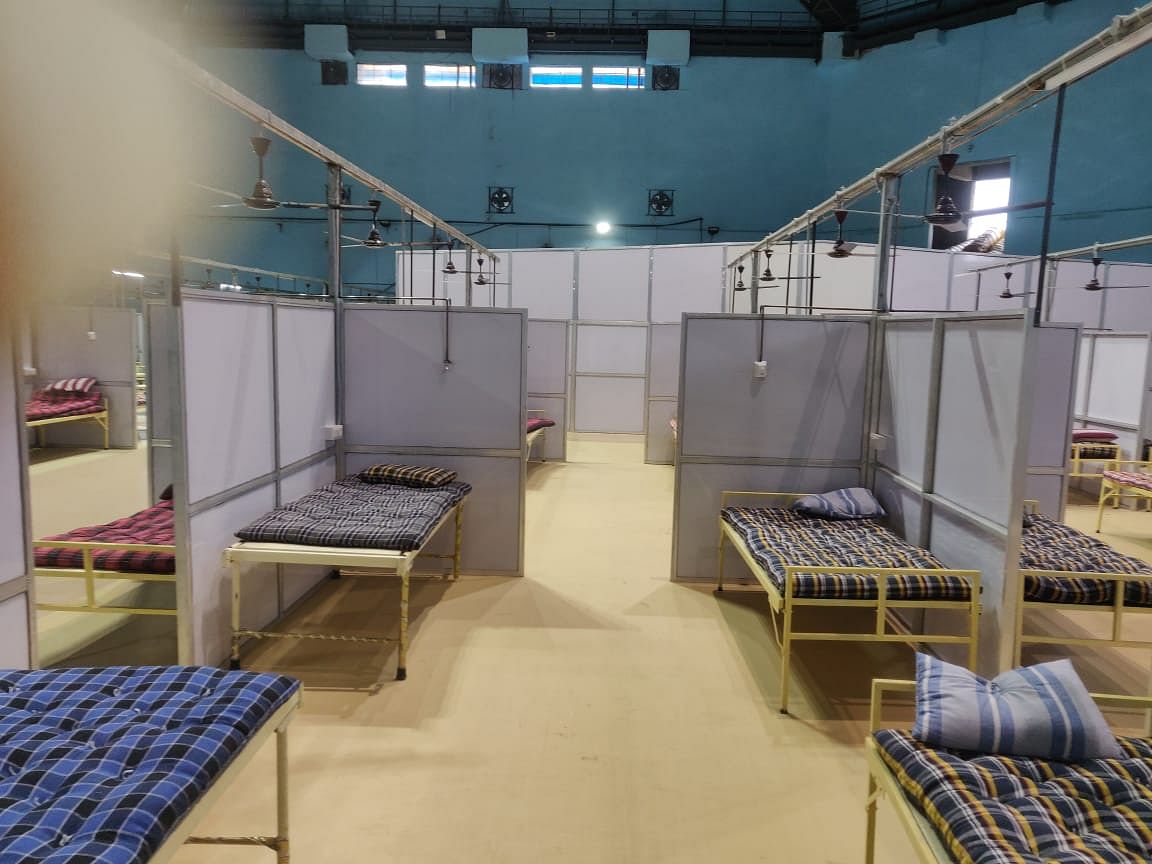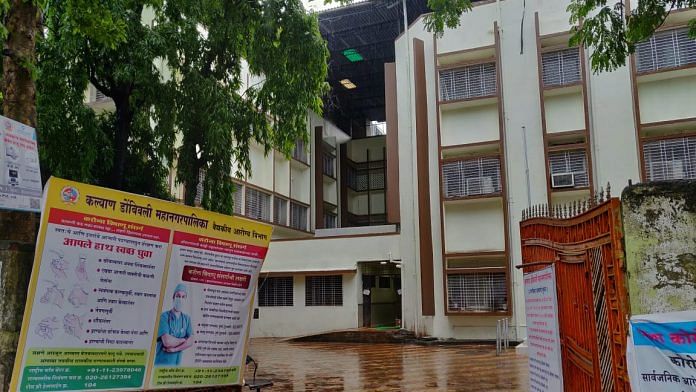Kalyan, Dombivali: Sixty-five Covid-positive patients on 42 beds — some receiving oxygen sitting on chairs, some lying on benches.
Over 30 beds stuffed into a ward that has space for only 12, in clear violation of the three-metre social distancing protocol, and four fatigued doctors running around collecting samples, attending to patients and managing paperwork as well.
Problems run deep at the Shastri Nagar General Hospital, the only dedicated government Covid hospital in Kalyan-Dombivali, a satellite town under the Mumbai Metropolitan Region (MMR).
The hospital is among two state-run medical institutions in the region catering to a population of 18 lakh. Since the pandemic struck, Shastri Nagar General Hospital solely treats Covid patients — the other, Rukmani Bai hospital, is for non-Covid patients.
That, however, is already taking a toll on Shastri Nagar General Hospital. Around 22 staff members, including doctors, have contracted the virus, leaving the hospital with only eight doctors and 18 nurses.
Now there are fears that it will crumble under the load as infection rates spike across the Kalyan-Dombivali area.
The region, which has 9,171 Covid-positive cases (as of 4 July), has been recording over 617 cases in a single day for the past two days, the highest single-day spike across all MMRs.
Such is the condition, that the Commissioner of the Kalyan-Dombivali Municipal Corporation (KDMC), Dr Vinay Suryawanshi, has brought together 17 private hospitals and also private doctors from different bodies including the Indian Medical Association, to work with the government.
“The health infrastructure here is very poor,” said Dr Suryawanshi. “There are only two municipal hospitals with 100 beds together, no ICU set-up or any specialists, physicians.
“As our cases started rising, many people started going to the Kasturba Hospital in Mumbai, but after a while, they stopped accepting patients from here as their own load increased,” he added. “That is when we had to approach private hospitals and doctor’s associations to come forward to help us,” Dr Suryawanshi said.
“KDMC then took over 17 private hospitals in the region in late April. They are now functioning as dedicated Covid hospitals,” he added.
Also read: Over 450 new cases daily, but Covid hotspot Thane doesn’t have enough ICU or oxygen beds
Congested localities, stigma, Unlock 1 behind surge
Kalyan-Dombivali is spread across a 116 sq km area and is densely populated. It has 25,000 people living per sq km.
Most people reside in the area because of cheap rentals and travel to Mumbai for work by buses and local trains.
It is these congested localities, Dr Suryawanshi explained, which are a main reason for the Covid-19 surge in the region.
“The region has 65 slums, and other small buildings and then high flats,” he said. “The entire area, however, is extremely congested with people living in close proximity, which became a reason for such a quick spread.”
According to statistics with the municipal corporation, up until 12 June, there were only 87 cases being reported in a day. This rose to 150 cases a day on 13 June, but now 617 cases of infections are being reported from the region on a daily basis for the last two days.
“Apart from the area being congested, lifting of the lockdown also played a role as people started moving to Mumbai for work,” Dr Suryawanshi said. “Moreover, the numbers are also growing because we are testing. Until now we have been testing 800 people a day that will now be increased to 1,500.
“Another reason is the stigma attached to the disease. Many people do not wish to come out when they get symptoms and use home remedies,” he added. “They then keep moving around, which then leads to a further spread.”
In order to contain the spread, KDMC has now intensified screening, with each ward having a corona committee. “As soon as we find people with fever, we isolate them,” Dr Suryawanshi said.
Also read: How many Covid cases in Maharashtra? State govt and civic bodies can’t make up their minds
Private hospitals holding the situation together
As cases began to rise in Kalyan-Dombivali, corporation authorities approached private practitioners and hospitals in April to start taking in Covid patients.
At first, another KDMC official said, none of the hospitals or staff were ready to treat the Covid-19 patients.
“It was a real struggle to convince owners to turn their hospitals into dedicated Covid ones. The next step was to convince the staff of nurses and doctors to work with the patients,” said the senior official from KDMC, who did not wish to be named. “No one was ready and many of the staff even ran away, fearing for their own lives.”
It is at this time that the Indian Medical Association stepped in to form the “Kalyan Doctor Army”.
“The government appealed to us to join the fight and help out in the crisis and we stepped up to help. Around 250 private doctors from Kalyan formed the Kalyan Doctor Army and asked all associations to join us,” Dr Prashant Patil of the Indian Medical Association, who is heading the Covid-19 task-force in the area, told ThePrint.
“After a few days we had 200 specialists (MBBS, MD), Ayush, homeopathy doctors and other staff with us,” he added. “These doctors then helped in getting the private hospitals and other doctors on board.
“We started counselling sessions for the staff and, in the end, we all managed to bring on board 17 private hospitals and signed an MoU with them,” he said.
“These private hospitals really came to the rescue because of their infrastructure,” Dr Patil added. “The Holy Cross hospital had 75 oxygen beds, 7 ICU beds using which the initial 291 patients were treated. Then many pregnant women, newborns, one as young as 19 days were treated.”
‘Not for the poor’
The 17 hospitals have been taken over by KDMC but they charge patients at the rates capped by the government. This, however, still puts them out of the reach of the poor as the rates are Rs 4,000 for a general ward, Rs 7,000 for a Deluxe and Rs 9,500 for an ICU bed per day.
And it has also shifted the Covid burden squarely back on government-owned Shastri Nagar General Hospital.
“Most patients who are positive come to us. When we refer any of them to a private facility, they start crying saying they cannot pay even the charges that are fixed by the government,” a senior doctor at Shashtri Nagar General hospital, who did not wish to be named, said.
“They are right, because a person who earns Rs 20,000 a month, cannot pay Rs 9,500 for an ICU bed or even Rs 4,000 for a general ward per day. And it is a matter not of one or two days, but two weeks.
“We are already overworked here. There are no beds, no wards, where do we keep them? Everyone wants to come here because it is free,” the doctor added. “The private facilities are for ones who can afford to pay and those people are very few.”
The government hospital also sees over 100 patients in the OPD complaining of fever, cough. As they do not have any space, doctors check the patients and if they appear fine, they are sent back for home quarantine.
Dr Patil said that there is a Mahatma Phule Yojana, using which patients can avail of free treatment at three of the private hospitals — R.R. Hospital, Holy Cross and Neon. “These three private hospitals are treating all patients free of cost, provided they are covered under the said scheme,” he aid.
The doctor at Shastri Nagar Hospital, however, said that these hospitals have limited beds, which are already full. Moreover, many people find it difficult to find beds under this scheme.
“There are only three hospitals under the scheme with 200-odd oxygen beds, all of which are full. One has to be lucky to get those beds as it is difficult to prove that you are covered under that scheme,” the doctor quoted above said. “This is the reason why most people prefer coming to the government facility, which has crossed its saturation limit.”
To be eligible for the scheme, a patient has to be a ration card-holder and needs a letter from the area tehsildar.
Still not enough beds, corporation steps in
Even though KDMC has roped in private hospitals, there are still not enough beds.
According to the corporation data, the Covid care centres that house patients with mild symptoms have 3,373 functional beds, of which 2,295 are already occupied.
In the dedicated Covid hospitals, which includes the private ones, there are 604 functional beds with oxygen, of which 556 are occupied and only 48 are vacant. And in the dedicated Covid Health Care Centres, 206 beds are functional, of which 69 are occupied.
In case of ICUs, there are 161 ICU beds, of which 158 are already occupied.
The KDMC is now coming up with more Covid care centres with oxygen beds on the Public Private Partnership (PPP) model. A third KDMC official said that the state government has sanctioned Rs 17 crore to the corporation for these efforts.
While one Covid centre is coming up at the Gymkhana Complex in Dombivali and will have 120 ICU beds, the Sawalaram complex will also have 150 oxygen beds and 30 ICUs. Another one is also coming up in Kalyan Lal Chowki with 250 oxygen beds and 120 ICU beds.
While all these complexes will be constructed and have their infrastructure provided by the corporation, they will be run by private agencies.
That is because even though the infrastructure has been readied by the corporation, it does not have staff to run the operation.
“We did three recruitment drives to recruit nurses, doctors, ward boys and chief medical officers but it was not successful. Then it was decided to outsource all the operation to private agencies,” the third official said.
“We bought a few agencies from Mumbai on board, who will now be running the operation with their own trained staff.
“Moreover, KDMC has also set up a Covid war room at the ward level and a BPO for home isolation, to ensure that all Covid-positive patients are tracked. This operation too has been outsourced,” he added.

Other patients getting ignored
The focus on Covid in Kalyan-Dombivali has hurt other patients, particularly due to the lack of infrastructure.
Take the case of Saroj Singh, who is worried about her father. He has been diagnosed with pneumonia but none of the hospitals are agreeing to admit him as all major private hospitals have now been turned into Covid hospitals.
For the non-Covid patients, there is only one government hospital — Rukmani Bai — or bigger private players like Fortis.
“I have been requesting hospitals to admit my father but they are refusing,” she said. “Initially they thought that he had Covid since the symptoms were similar. So they admitted him to the RR hospital. Then the reports came negative and they are asking me to take him back, since they are only treating Covid patients.
“Other hospitals, however, are not ready to take him,” she added.
“I understand that treating Covid patients is important but should other patients get ignored in the process?” she said.
Kranti (who goes by one name), a resident of Kalyan, is also facing a similar problem. “My mother is diabetic and she is also a kidney patient,” she said.
“She needs regular dialysis but now there are so limited places that are taking patients for it. I had to try six to eight places before a doctor at a private hospital agreed to do it.”
Also read: Spitting, no masks, vegetables dragged through urinal — inside a Navi Mumbai Covid hotspot




Avoid outside food for sometime